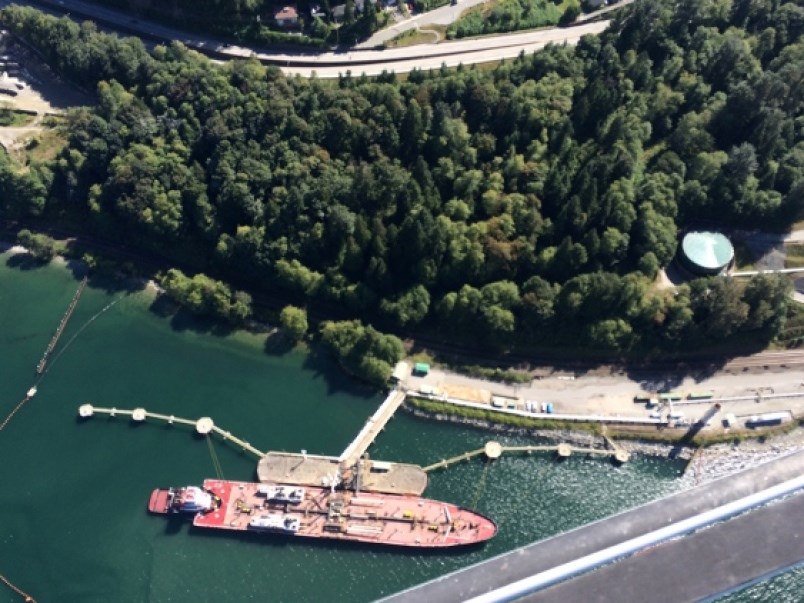The provincial government has given its blessing for Kinder Morgan’s Trans Mountain pipeline. But local First Nations say the project will never be built.
Premier Christy Clark and Environment Minister Mary Polak made the announcement on Wednesday afternoon that the project had been granted an environmental certificate and that it had met the premier’s five conditions related to spill response, Aboriginal rights and title, and a “fair deal for B.C.”
Within the hour of the announcement, however, a message posted to the Tsleil-Waututh’s official Twitter account declared “It will never get built.”
“Just because this announcement occurred and the federal announcement occurred approving the environmental assessment permits, it does not mean it’s a green light,” said Tsleil-Waututh elected council member Charlene Aleck. “In order to be an effective pipeline, it needs to be 100 per cent built so if I am just one per cent saying no, that’s not an effective pipeline.”
The nation is still seeking further judicial review of the federal approval, Aleck said.
“It’s back to court for us,” she said. “It’s totally breaking our Aboriginal law. We’re upholding (our laws) as a nation and if they come into our territory and start construction in our territory, there will be ways to stop them.”
North Vancouver-Seymour MLA Jane Thornthwaite, whose riding encompasses Tsleil-Waututh lands and sits across Burrard Inlet from the Kinder Morgan’s Westridge Terminal, said she shares the concerns she’s heard from her constituents about the risk of a spill. But, she added, a lot of progress has been made in the last four years.
“I have to believe the experts. I have to believe the science that these extra measures are going to make a spill in our waters very unlikely,” she said. “When I looked at the details on the spill regime, both on the ocean protection plan from the federal government, Kinder Morgan’s plan and new legislation from the province, it’s pretty comprehensive. … But it’s not there yet.”
Thornthwaite said while there may be some political price for the Liberals to pay during this spring’s election, anti-pipeline voters will likely gravitate to the Green Party, as the NDP has flip flopped on the Kinder Morgan proposal.
On the First Nations matter, Thornthwaite said she believes the federal government is continuing its discussions with the Tsleil-Waututh. And other nations along the pipeline do support the project, she added.
“It is their land and their waters but other First Nations along the pipeline had actually approved and come into agreements with both the federal government and Trans Mountain on these mutual benefit agreements for their people. It isn’t 100 per cent of First Nations that are not happy. Some First Nations are supportive,” she said.
The province’s environmental groups and its municipalities will benefit from the $20 million to $50 million B.C. will receive annually due to a funding agreement with Trans Mountain, Thornthwaite added.
Officially, all that remains now before construction begins is for the Kinder Morgan board of directors to make its final investment decision. A release from the company, stated construction is expected to begin in 2017 with the pipeline coming online in 2019.
“We believe this represents a positive outcome for our company, customers and for British Columbians and all Canadians who will benefit from the construction and operation of an expanded pipeline,” said Ian Anderson, president of Kinder Morgan Canada in a release.
Squamish Nation Chief Ian Campbell said he was not surprised but disappointed by the announcement. He too said Aboriginal rights and title had not been respected throughout the process.
“I want to be very clear that the Squamish Nation are deeply disappointed in the province’s inability to take a stand on this and show real leadership,” he said. “The NEB and the process thus far has been a complete farce. It does not meaningfully engage First Nations or allow us to fully delve into the assessment of the project.”
Campbell said a spill on the inlet would “grossly impact our homelands and waters and further alienate the Squamish Nation from our lands and resources and that of our neighbours throughout the Salish Sea.”
Any attempt to raise those concerns with senior levels of government have been met with vague generalities, he added.
“Any notion of ocean protection or the ability to clean up simply isn’t true. What we’ve seen on the coast in recent as well as past events is that accidents do happen and the ability to clean (bitumen) up or restore the environment is really just a political optic that governments like to play,” he said.
Campbell said he would be meeting with the leadership of other First Nations next week to begin co-ordinating their legal strategies going forward.
Local First Nations members themselves will also be apt to resume protests in order make their opposition clear, Campbell said.
“I think we’re going to see a lot more of that in the coming months,” he said. “We’re certainly committed to do whatever it takes to stop this pipeline.”



